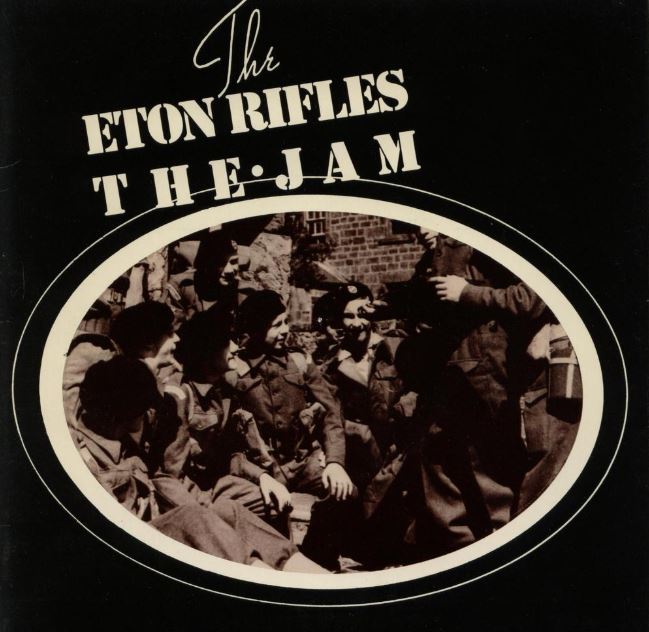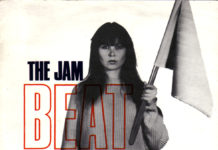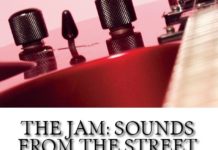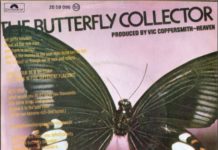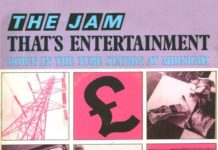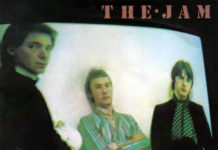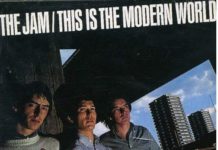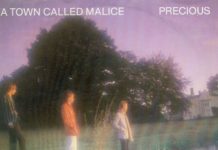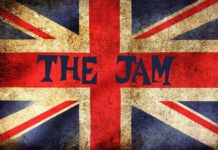The Eton Rifles (Weller)
Recorded on 15 August 1979 at Townhouse Studios, Shepherd’s Bush, London
Produced by Vic Coppersmith Heaven and The Jam
A-side released 22 October 1979; Polydor POSP83; reached no 3 in UK chart
B-side: ‘See-Saw’
Album track: Setting Sons
Written in the Weller family’s holiday caravan at Selsey Bill (of ‘Saturday’s Kids’ fame), ‘The Eton Rifles’ is driven by an imaginative, thundering bass line complemented by Buckler’s tight machine-gun drumming and Weller’s clashing, double-tracked Rickenbacker.
Buckler, in fact, regarded it as one of his favourite tracks to play live. The song’s live radio debut took place about a fortnight after its release, on the John Peel show on 5 November 1979, and it was played again a month later at The Jam’s In Concert show from The Rainbow Theatre.
Coming as it did at the end of the year of the mod revival (which The Jam were largely, if unfairly, credited with creating), the power and sentiment of ‘The Eton Rifles’ surprised many.
Traditional mod bands sang loose, poppy songs about love and Friday nights out. Yet here were The Jam thundering out a clever satire on the class system via one of the ultimate Establishment strongholds, Eton College.
But rather than uphold the usual all-conquering revolutionary image, Weller mockingly allowed the gentry to win his imaginary conflict by suggesting that ‘his side’ came out far worse than the boys of Eton during the imaginary battle.
But their spirits remained high and they would all be back next week for another go.
In fact, the music was pretty much a deliberate message to the band’s fans: ‘Look, we are not a mod band. You try dancing to this in your mohair suits and loafers.’ But once again critics missed the humour in the song, focusing solely on its anti-establishment theme instead.
An acoustic demo of the song appears on the 1992 compilation album Extras, which was recorded as Weller played a rough version to the others to demonstrate the new track.
Weller: ‘I believed then, as I believe now, that if a song still sounds good when you sit down and play it with just a voice and a guitar then you know you’ve got a good song. With ‘Eton Rifles’ I certainly did sit down and figure it all out before I played it to anyone. And I can understand how it might have been tough on Rick and Bruce when I presented them with a song like that and virtually told them what to play. It must have been especially frustrating for Bruce because he has such a distinctive style. But ‘Eton Rifles’ was an exception. Most of the time all I had were rough ideas and fragments and we would hammer them out together, with everybody contributing ideas.’
Unhappy with their lack of airplay, those close to The Jam complained to Polydor that the marketing department just wasn’t working hard enough for them. But Polydor saw The Jam as only having limited cult appeal and were not prepared to invest in the band.
The Weller’s fractious relationship with the label didn’t help matters and it fell to Polydor A&R man Dennis Munday to glue the two sides together. Munday: ‘We had problems with Polydor’s promotion department, who didn’t get on with the Wellers, so Paul’s dad phoned me up and said he wanted it changed.
When I played ‘Eton Rifles’ to Polydor they gave me the standard response that they didn’t see Radio 1 playing it because of its political content. I then played it to Clive Banks, who was one of the best independent pluggers around, who thought that with some hard work he could get it on a B play list.’
That was better than nothing, so The Jam fired Polydor’s promotional team and brought in Banks, who managed to promote wide-ranging airplay, taking the single to number three in the UK charts. The band were delighted and from then on the major radio stations just couldn’t afford to ignore The Jam.
And the song went by no means unnoticed at Eton itself. The Eton College Chronicle of Friday 16 November 1979 (the same day the song’s parent album, Setting Sons, was released) carried an interview with Weller written by the future music journalist Tim de Lisle.
‘Released at the start of Long Leave [ie, half term], the Jam’s ‘The Eton Rifles’ has by now sold an estimated 150-200,000 copies, the most successful single of a pretty successful group,’ wrote de Lisle. ‘Approved by the critics and picked up by disc-jockeys, ‘The Eton Rifles’ was top of Capital’s Hit Line within five days of release.
‘I asked [Weller] exactly what Eton Rifles was about. “Basically, it’s, like, taking the mickey out of class. It’s meant to be humorous – I think for a start the title’s funny. It’s an imaginary setting, the two classes clashing, with the trendy revolutionary saying to the man in the pub, ‘Come on, sup up your beer, there’s a row on up the road,’ and it is like, ‘The revolution will start after I’ve finished my pint.’ I got the inspiration for the song from watching a programme on the BBC called, I think, Camera.
They showed an old photo of the Eton Rifles and I thought, what a great name … It’s not a political song in the sense of 10 Downing Street politics, but of everyday politics. Yes, I am against little boys going off to fire blanks at each other … It’s not that I’m bitter about my own education, it was pretty good in fact. But I think that everyone has a right to a good education and they’re just not getting it. It’s the old story, isn’t it? Every man is equal but some are more equal than others. That still exists.”
‘The song’s images are thankfully and surprisingly unhackneyed,’ de Lisle concluded, ‘and in several cases very appropriate: beer, tea, Slough, rugby, rain stopping play, all are features of Eton life. But Weller has never visited Eton; he happened to know it was near Slough; the song is not intended to be very specific.
“I’ve got nothing against Etonians personally. Eton’s just a symbol for the song. They’re not annoyed about it, are they?” I said no, they’re not, they’re buying it in droves. “Great,” said Paul Weller, “that’s fantastic. It’ll probably go to Number One.”’
As it turned out, however, The Jam would have to wait until the following year before attaining that coveted position.
In 2010 old Etonian and British Prime Minister, David Cameron, listed the song as one of his all time favourites. ‘He obviously hasn’t listened to the lyrics then has he?’ Weller responded. – Albert Jack
Albert Jack AUDIOBOOKS available for download here
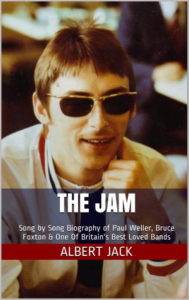
The Jam: Sounds From the Street

